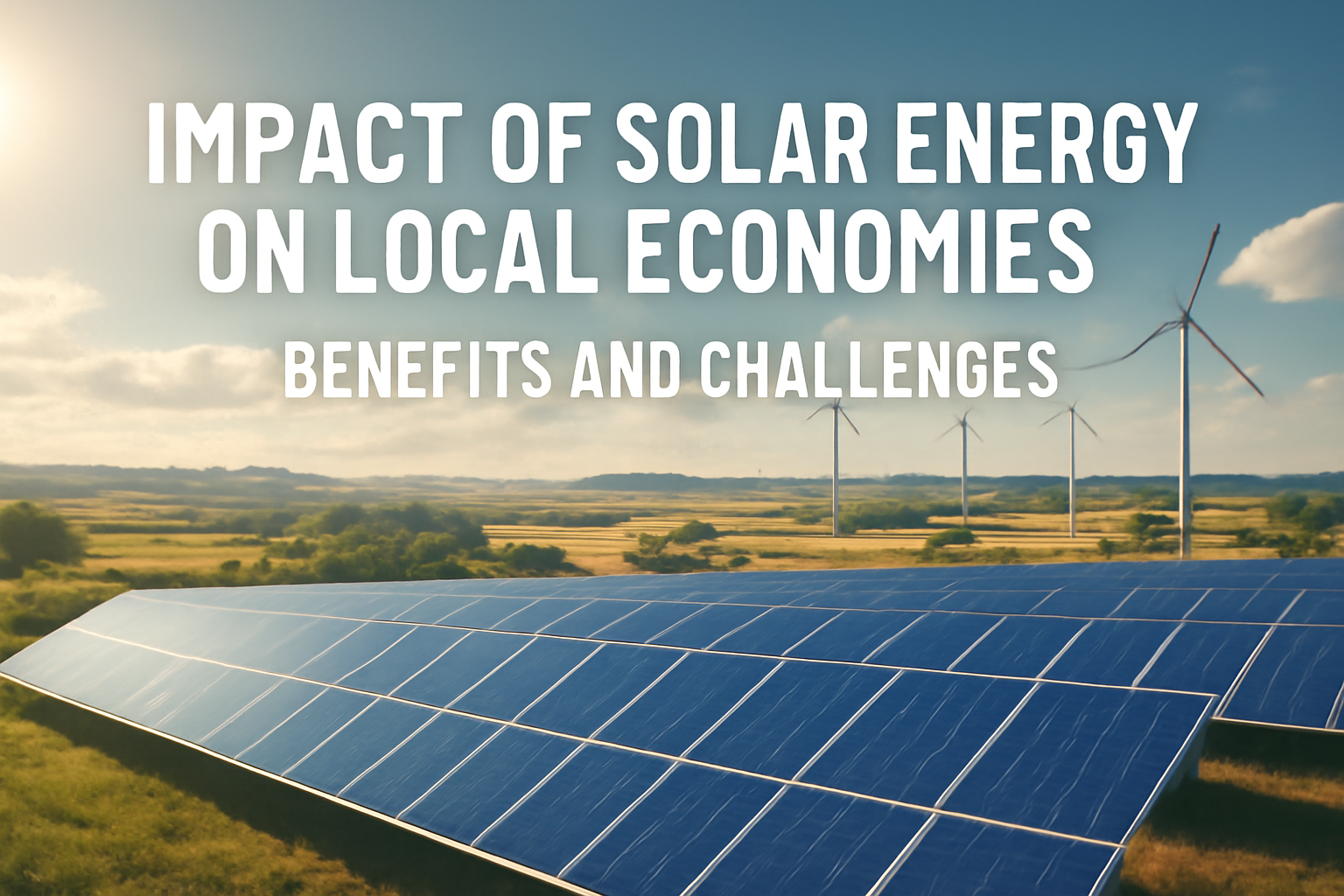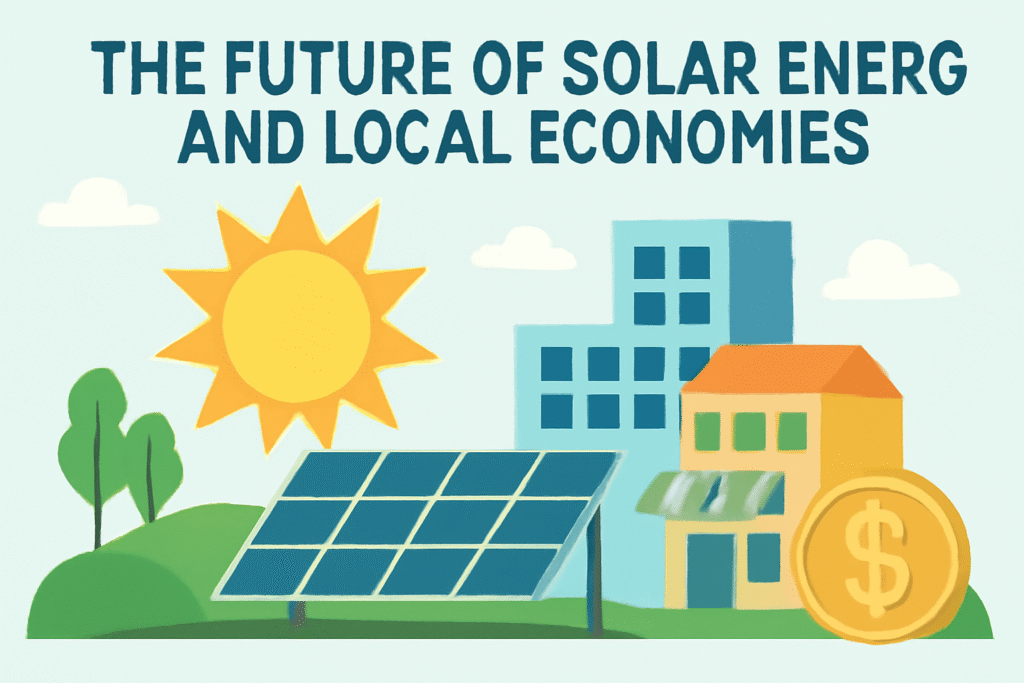Impact of Solar Energy on Local Economies: Benefits and Challenges

In recent years, solar energy has become one of the most talked-about renewable resources. But how does it affect local economies? Many people may be familiar with the environmental benefits of solar power, but the positive effects on local economies often get overlooked.
In this article, we will explore the impact of solar energy on local economies, focusing on how it creates jobs, reduces costs, and promotes sustainable growth.
What is Solar Energy?

Before diving into its economic impact, let’s first understand what solar energy is. Solar energy is the power we get from the sun. This energy is harnessed through solar panels that convert sunlight into electricity. This process is clean and renewable, meaning it does not deplete natural resources or create harmful pollution. The technology for capturing and storing solar energy has greatly improved over the past few decades, making it a viable option for both large-scale and residential use.
How Solar Energy Impacts Local Economies
1. Job Creation
One of the most significant impacts of solar energy on local economies is the creation of jobs. The solar industry has proven to be a major source of employment, offering opportunities in manufacturing, installation, and maintenance. In fact, according to reports, the solar sector has created more jobs in recent years than the coal industry.
This growth is especially beneficial for local communities. For example, a new solar power plant or installation project can bring dozens, if not hundreds, of jobs to an area. These jobs can range from construction workers to engineers, electricians, and salespeople. Additionally, local businesses can benefit from increased demand for goods and services needed to support solar energy projects.
2. Cost Savings for Local Governments and Businesses
Solar energy helps lower electricity bills, which is a major benefit for local governments and businesses. By investing in solar panels, many local authorities can reduce their energy costs, which can be redirected to other important community needs, such as schools, hospitals, and infrastructure.
For businesses, solar energy means lower operational costs. Solar panels can reduce a company’s electricity bill significantly, and over time, these savings can be reinvested into business growth, leading to greater productivity and economic expansion in the community.
3. Energy Independence
Another important aspect of solar energy is that it promotes energy independence. Instead of relying on outside sources for electricity, local communities can produce their energy. This reduces the reliance on imported fuels and the vulnerability to energy price fluctuations.
For local economies, energy independence means greater stability and security. It helps protect communities from the unpredictable nature of energy markets, which can be especially important in times of global uncertainty.
4. Increased Property Values
Solar panels not only help reduce energy costs, but they can also increase property values. Many homebuyers are looking for energy-efficient homes, and solar panels are a great way to make a property more attractive. This is especially true in areas where energy prices are high.
Increased property values are beneficial for local economies because they help generate more revenue through property taxes. When property values rise, local governments can collect more in taxes, which can be used to improve public services and infrastructure.
5. Environmental Benefits Leading to Long-Term Economic Stability
Solar energy is also a key factor in protecting the environment. By using solar power, communities reduce their carbon footprints, helping to combat climate change. This has long-term economic benefits because the environmental damage caused by traditional energy sources, such as coal and oil, can lead to costly repairs and health issues down the line.

Investing in solar energy helps create a cleaner, healthier environment, which in turn boosts the local economy by reducing healthcare costs and promoting long-term sustainability. As people become more environmentally conscious, businesses that adopt solar energy may attract customers who prefer eco-friendly companies.
How Solar Energy Encourages Sustainable Growth
Solar energy plays a crucial role in promoting sustainable growth in local economies. It encourages the use of renewable resources, which are abundant and free, unlike fossil fuels. By using solar energy, communities can grow without harming the planet or depleting resources.
Solar power also helps reduce the strain on local power grids. In areas with high electricity demand, solar energy can alleviate pressure on the grid, helping prevent outages and reducing the need for costly infrastructure upgrades.
Furthermore, solar energy helps diversify local economies. Areas that heavily rely on one industry, such as oil or coal, can be at risk of economic downturns if those industries decline. By integrating solar energy into the local economy, communities can diversify their energy sources and build a more resilient, future-proof economy.
Challenges of Solar Energy on Local Economies
While solar energy offers numerous benefits to local economies, some challenges need to be addressed. For instance, the initial cost of installing solar panels can be expensive. This can be a barrier for some businesses or homeowners who may not have the financial resources to make the upfront investment.
Additionally, solar energy requires proper infrastructure, such as storage systems and skilled workers for installation and maintenance. In rural or less-developed areas, this may present a challenge in terms of availability and affordability.
However, these challenges can be overcome with the right policies and incentives. Government subsidies and tax credits can make solar energy more accessible to local communities, while training programs can help develop a skilled workforce to support the solar industry.
The Future of Solar Energy and Local Economies
The future of solar energy looks bright. With continued advancements in technology and government support, the use of solar energy is expected to grow exponentially. Local economies will benefit as solar energy becomes more affordable, efficient, and widespread.

In the coming years, we can expect to see more communities investing in solar power, not just as a way to reduce energy costs, but as a key driver of economic growth. As more businesses, homes, and local governments switch to solar energy, the positive impacts on local economies will become even more evident.
Conclusion
The impact of solar energy on local economies cannot be overstated. From job creation to cost savings, energy independence, and increased property values, solar power is transforming communities and driving sustainable economic growth. While challenges exist, the long-term benefits far outweigh the obstacles. As technology advances and solar energy becomes more affordable, it’s clear that solar power will continue to play a crucial role in shaping the future of local economies.
FAQ: Impact of Solar Energy on Local Economies
1. How does solar energy create jobs in local economies?
Solar energy creates jobs in manufacturing, installation, and maintenance. It also boosts the local economy by increasing demand for services and materials needed for solar power projects.
2. What are the cost savings associated with solar energy?
Local governments and businesses can reduce their energy bills by investing in solar energy, allowing them to redirect savings into other important areas like infrastructure, healthcare, and education.
3. How does solar energy promote energy independence?
By producing their electricity through solar power, local communities reduce their reliance on external sources of energy, leading to greater stability and security.
4. Can solar energy increase property values?
Yes, homes with solar panels are often more attractive to buyers, leading to higher property values. This benefits local economies by increasing property tax revenue.
5. What challenges does solar energy face in local economies?
The high upfront cost of installation and the need for specialised infrastructure and workers can be challenges for some local communities, but these can be overcome with proper support and incentives.
